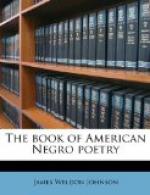“I know de moonlight, I know
de starlight;
I lay dis body
down.
I walk in de moonlight, I
walk in de starlight;
I lay dis body
down.
I know de graveyard, I know
de graveyard,
When I lay dis
body down.
I walk in de graveyard, I
walk troo de graveyard
To lay dis body
down.
I lay in de grave an’
stretch out my arms;
I lay dis body
down.
I go to de judgment in de
evenin’ of de day
When I lay dis
body down.
An’ my soul an’
yo’ soul will meet in de day
When I lay dis
body down.”
Regarding the line, “I lay in de grave an’ stretch out my arms,” Col. Thomas Wentworth Higginson of Boston, one of the first to give these slave songs serious study, said: “Never it seems to me, since man first lived and suffered, was his infinite longing for peace uttered more plaintively than in that line.”
These Negro folksongs constitute a vast mine of material that has been neglected almost absolutely. The only white writers who have in recent years given adequate attention and study to this music, that I know of, are Mr. H.E. Krehbiel and Mrs. Natalie Curtis Burlin. We have our native composers denying the worth and importance of this music, and trying to manufacture grand opera out of so-called Indian themes.
But there is a great hope for the development of this music, and that hope is the Negro himself. A worthy beginning has already been made by Burleigh, Cook, Johnson, and Dett. And there will yet come great Negro composers who will take this music and voice through it not only the soul of their race, but the soul of America.
And does it not seem odd that this greatest gift of the Negro has been the most neglected of all he possesses? Money and effort have been expended upon his development in every direction except this. This gift has been regarded as a kind of side show, something for occasional exhibition; wherein it is the touchstone, it is the magic thing, it is that by which the Negro can bridge all chasms. No persons, however hostile, can listen to Negroes singing this wonderful music without having their hostility melted down.
This power of the Negro to suck up the national spirit from the soil and create something artistic and original, which, at the same time, possesses the note of universal appeal, is due to a remarkable racial gift of adaptability; it is more than adaptability, it is a transfusive quality. And the Negro has exercised this transfusive quality not only here in America, where the race lives in large numbers, but in European countries, where the number has been almost infinitesimal.
Is it not curious to know that the greatest poet of Russia is Alexander Pushkin, a man of African descent; that the greatest romancer of France is Alexander Dumas, a man of African descent; and that one of the greatest musicians of England is Coleridge-Taylor, a man of African descent?




